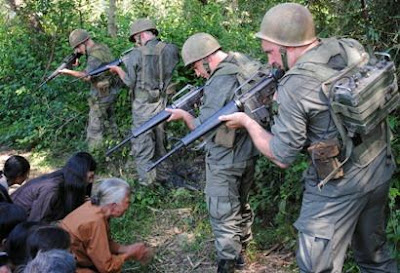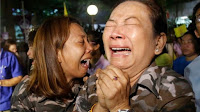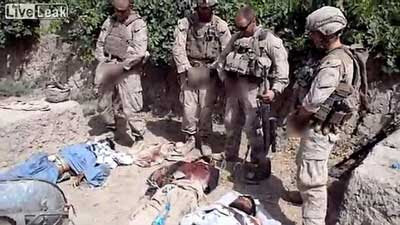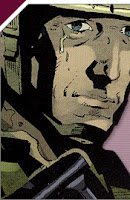UCLA (Center for the Art of Performance); LAT; CC Liu, Pfc. Sandoval (eds.), Wisdom Quarterly
 |
| The "American War," see it yourself: My Lai massacre site tour (hueprivatetours.com) |
 |
| Vietnamese instrumentalist Vân-Ánh Võ plays instruments made from what used to be American weapons of war against Vietnam (Maria Alejandra Cardona/Los Angeles Times) |

They
have pursued a singular artistic vision that dates back to the
ensemble’s origins.
In 1973 David Harrington was inspired to form the Kronos Quartet after hearing George Crumb’s Black Angels -- a highly unorthodox,
Vietnam War-inspired work featuring bowed water glasses, spoken word
passages, and electronic effects.
 Kronos revisits the inspiration for the
founding of the group with My Lai.
Kronos revisits the inspiration for the
founding of the group with My Lai.
The infamous 1968 massacre by American soldiers of
unarmed Vietnamese villagers provides the context
for this gripping new work... featuring Vietnamese multi-instrumentalist Vân-Ánh Võ.
It's told from the perspective of the heroic helicopter pilot Hugh
Thompson, who tried to stop the slaughter and was vilified for reporting
it. More
My Lai massacre, 50 years later: Jonathan Berger's opera captures the madness
 |
| Shut the hell up! Shut the hell up!! You're all DEAD for messing with the US of A! |
 |
| The Mỹ Lai Massacre was the US soldiers' mass murder of between 347 and 504 innocent, unarmed civilians in South Vietnam on March 16, 1968. It was committed by U.S military men who raped children and killed women and old men as ethnic cleansing. |
.
 |
| I didn't mean it. It was orders from the top! |
Thompson may no longer know what is real, but we do.
During his second landing, the pilot says he had to "dive, and dive, and
dive…into madness." The listener is right there with him.
 |
| Murdered Vietnamese man and sons (W) |
But he can just as convincingly turn melancholic and, ultimately, angelic, the inexpressible very much being conveyed.
 |
| Ronald Haeberle bravely documented American War crimes at My Lai, bodies burning (W) |
 |
| Hold him while I kick him in the head for looking at me funny! Teach him to squint at me! Here, get out of the way, I'm blowing his motherfatherin' head off right here! (G-P) |
.
 |
| Whoa, did we do that...in Afghanistan, too? |
The quartet here does not call attention to itself, but its instinctual rightness makes any given moment matter.
After
a half-century, it is now easy enough to memorialize the dead of My Lai
and honor Thompson to assuage our collective guilt. That's not Berger's
"My Lai."
The work does not truck in anodyne catharsis even as it
reminds us of our ability to stumble across beauty when there is
otherwise no meaning, only insanity, to be found. More
 |
| Yum, let's go eat dead meat to celebrate! Irony |
- VeteransForPeace.org
- CODEPINK.org
- Forgotten hero stopped My Lai massacre 50 years ago today
- "No survivors": America's My Lai massacre in Vietnam Fifty years on from the US massacre and 10 years since AJ first traveled to Vietnam, have lessons been learned?
- Vietnam commemorates 50th anniversary of My Lai massacre (ABC News) Members of My Mai Peace Foundation prepare for a photo exhibition commemorating the 50th anniversary of My Lai massacre in Son My, Vietnam.
- 50 years ago, the My Lai massacre shamed my US military (ABC) In this 2018 photo footprints of villagers and U.S soldiers' combat boots are reconstructed in My Lai memorial site in Son My, Vietnam. On March 16, 1968, U.S soldiers of Charlie Company, sent on what they were told was a mission to confront a crack outfit of their Vietcong enemies...
- My Lai Massacre: Facts, Map, and Photos (Britannica.com)
In his book Kill Anything That Moves, Nick Turse reveals that the American War’s casualty figures are
staggering. From 1955 to 1975:
- The United States killed more than 5,800,000 military personnel in Southeast Asia.
- Vietnamese troops were wounded around 30,400,000 times.
- Of those, 15,300,000 cases were serious enough to require hospitalization.
- And 7,500,000 veterans were left severely disabled.
- [These number were 100 times less for US soldiers who invaded Vietnam to rape, pillage, murder, subjugate, and enslave the Vietnamese.]
 |
| Should we burn 'em, sarge? |
Nick Turse also states that according to Westmoreland’s memoir, MacArthur “urged me to
make sure I always had plenty of artillery, for the Oriental, he said, ‘greatly fears artillery,’” and suggested that Westmoreland might have
to employ a “scorched earth policy” in Vietnam (p.61).
Oops, we did it again...in Afghanistan
 |
| Hey, let's pee on these corpses, guys, then take a selfie of our war crimes. - Let's do it. |



































































































































































































































1 comment:
It was a sad story. I got shocked when first saw this. But let bygone be bygone! No one win the war!
Post a Comment